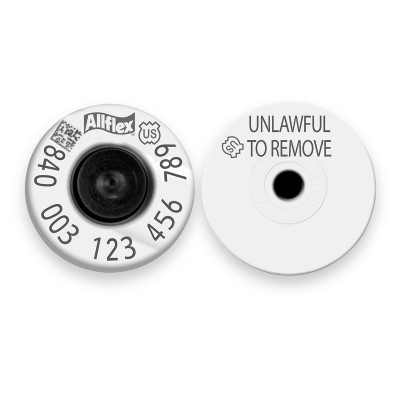RFID Tags - The What, Why, and How
Amy Barkley, Team Leader & Livestock Specialist
Southwest New York Dairy, Livestock and Field Crops Program

Radio frequency Identification tags, commonly known as RFID tags, are one of the USDA-approved official identification tags for cattle, deer, and swine. While not yet required by law, the use of these tags is increasing, with the goal being to have all producers using them. This article shares some information on what these tags are, how they work, and how you can order them for free for your herd.
What is an RFID tag?
These tags are technologically very simple. They are a button tag that shares a unique 15 digit ID number that will follow the animal through it's life. There are some non-official tags out there, and the official tag is what's called an 840 RFID tag. This tamper-evident tag sports the US shield, a 15-digit number starting with "840", the manufacturer's logo, the statement, "Unlawful to Remove", and an RFID chip embedded inside.
How does the tag work?
The individual number on the tag can be used by the producer for tracking in addition to standard ear tags. However, the tag number is also digitized on the RFID chip. This allows for quick identification of animals by officials using a quick scan should the animals need to be inventoried during a disease outbreak. By knowing where cattle are across the country and identifying cattle of unknown origin quickly, diseases can be contained rapidly, limiting spread to additional animals.
Who needs to use these tags?
NYS law states that all cattle moving across state lines should be permanently identified with a USDA approved ear tag. This can include an RFID tag. Even if not intending to move cattle out of the state, it's good practice to begin using them in addition to standard farm ID tags. Tags are free from Ag and Markets, so besides adding a line in your cattle records for this additional identification number, there's very little extra work needed on the producer's end.
Where can I get tags?
NYS Department of Ag and Markets supplies free tags and tag applicators to farmers across NYS. Forms can be found by visiting https://agriculture.ny.gov/system/files/documents/2023/01/ai-489_order_form_producer_ear_tags.pdf We have also included a form on the following page that you can fill out, cut out, and send in to NYS Ag and Markets.
Upcoming Events
Boots in the Barn: Cornell Dairy Research Updates
January 13, 2026
January 20, 2026
January 27, 2026
February 3, 2026
February 10, 2026
February 17, 2026
February 24, 2026
Join us for some or all!
Webinar: Converting Old Dairy Barns into swine Facilities
January 21, 2026 : Webinar: Converting Old Dairy Barns into swine Facilities
Tim Terry, Farm Strategic Planning Specialist with Cornell's Pro-Dairy program will share information on what it takes to transition an old dairy barn for swine production. We plan to cover flooring, ventilation, and lighting, considerations for system workability, and more! Registration is free.
Southern Tier Crop Congress
January 28, 2026 : Southern Tier Crop Congress
Belfast, NY
Join SWNYDLFC and CCE Allegany County for the upcoming Southern Tier Crop Congress. CCA and DEC credits are available!
Announcements
Cows, Crops & Critters Newsletter Sponsorship
TRYING TO REACH GROWERS AND AGRIBUSINESSES IN OUR SOUTHWEST REGION OF NEW YORK?Weekly Email Update: Shared with 625+ households who have signed up with our program.
Monthly Paper Mailer: To reach our stakeholders and farmers who lack internet access, we send out a monthly mailer where your company's logo and contact information would be featured with a mailing list of 330+ households.
If you sponsor our weekly and monthly publications you reach approximately 955 households.





